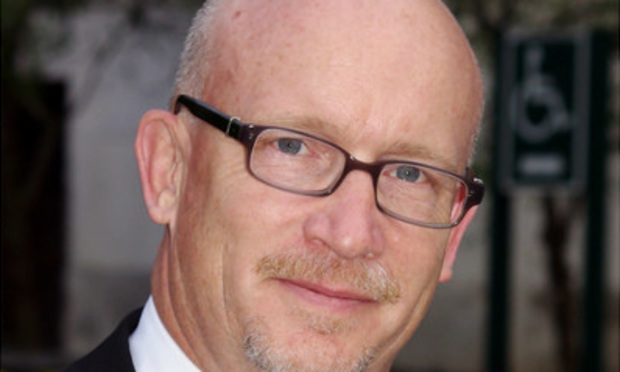Oscar-Winning Documentarian Denied Video From Theranos Depositions in Del.
A Delaware Court of Chancery vice chancellor on Monday denied Academy Award-winning director Alex Gibney access to discovery materials from two investor lawsuits filed against Theranos and its directors, as he prepares a feature-length documentary about the embattled blood-testing company.
April 23, 2018 at 06:31 PM
3 minute read
The original version of this story was published on Delaware Law Weekly
 Alex Gibney. Photo Credit: David Shankbone via Wikimedia Commons
Alex Gibney. Photo Credit: David Shankbone via Wikimedia Commons A Delaware Court of Chancery judge on Monday denied Academy Award-winning director Alex Gibney access to discovery materials from two investor lawsuits filed against Theranos Inc. and its directors, as he prepares a feature-length documentary about the embattled blood-testing company.
Gibney, who won an Oscar for the film “Taxi to the Dark Side,” had asked Vice Chancellor J. Travis Laster in March for access to all video from depositions conducted in the cases, including recordings corresponding to about 200 pages of redacted testimony that Laster made public last year.
The records, Gibney said, remained of “vital public interest” and would be “invaluable” to his ability to tell Theranos' story.
“If ever the presumption of openness should govern, it is here,” Gibney wrote in a four-page letter. “The records we are seeking are central to understanding the legal dispute—who did what and why; how systems and safeguards failed.”
Both cases, filed by Theranos investors Partner Investments, were settled in 2017, before any video was submitted to the court, and Laster refused to turn over video from the excerpts that had already been released.
“The transcript version of the testimony and the video version of the testimony are conceptually distinct,” Laster said in a nine-page memorandum opinion.
“Gibney seeks access to discovery materials that were never filed with the court. Under settled precedent, Gibney cannot access these materials.”
Gibney's production company, Jigsaw Productions Inc., did not respond Monday to questions regarding Laster's decision and the forthcoming project. In his letter to the court, Gibney said he was preparing a feature-length documentary for HBO Films.
A representative from Chelsea Pictures, which represents Gibney, said it only discusses the filmmaker's commercial work and declined to comment beyond the scope of that arrangement.
Gibney said in court documents that he feared refusal to release the depositions in their entirety would allow Theranos to present a “one-sided” story that omits crucial details and context.
Theranos has been the subject of intense scrutiny in recent years over its failure to successfully bring to market technology that it said would revolutionize blood testing by allowing a full battery of tests to be conducted off of just a few drops of blood taken from a patient's finger. It was later learned that the company lacked the infrastructure to deliver on the promises, which garnered more than $400 million in funding by 2014.

Elizabeth Holmes, chief executive officer of Theranos Inc. Photo Credit: Krista Kennell/Shutterstock.com
Theranos and its CEO Elizabeth Holmes have agreed to settle the fraud charges filed by the U.S. Securities and Exchange Commission. Holmes has agreed to pay a $500,000 penalty, be barred from serving as an officer or director of a public company for 10 years, return the remaining 18.9 million shares she obtained during the fraud, and relinquish her voting control of Theranos.
Gibney was not represented by an attorney in making his request. His other work includes the Oscar-nominated documentary ”Enron: The Smartest Guys in the Room” and “Going Clear: Scientology and the Prison of Belief,” a 2015 film produced by HBO.
His film “Taxi to the Dark Side,” which centered on torture at a U.S. military base in Afghanistan, won the Academy Award for Best Documentary Feature in 2008.
This content has been archived. It is available through our partners, LexisNexis® and Bloomberg Law.
To view this content, please continue to their sites.
Not a Lexis Subscriber?
Subscribe Now
Not a Bloomberg Law Subscriber?
Subscribe Now
NOT FOR REPRINT
© 2025 ALM Global, LLC, All Rights Reserved. Request academic re-use from www.copyright.com. All other uses, submit a request to [email protected]. For more information visit Asset & Logo Licensing.
You Might Like
View All

Zoom Faces Intellectual Property Suit Over AI-Based Augmented Video Conferencing
3 minute read
Etsy App Infringes on Storage, Retrieval Patents, New Suit Claims

Trending Stories
- 1Ex-Prosecutor Denies on Witness Stand That She Tried to Protect Ahmaud Arbery's Killers
- 2Latham's Lateral Hiring Picks Up Steam, With Firm Adding Simpson Practice Head, Private Equity GC
- 3Legal Restrictions Governing Artificial Intelligence in the Workplace
- 4Failure to Adequately Inform Patients
- 5'FTX' One Year Later: The Impact on Examiner Practice in Bankruptcy Courts
Who Got The Work
J. Brugh Lower of Gibbons has entered an appearance for industrial equipment supplier Devco Corporation in a pending trademark infringement lawsuit. The suit, accusing the defendant of selling knock-off Graco products, was filed Dec. 18 in New Jersey District Court by Rivkin Radler on behalf of Graco Inc. and Graco Minnesota. The case, assigned to U.S. District Judge Zahid N. Quraishi, is 3:24-cv-11294, Graco Inc. et al v. Devco Corporation.
Who Got The Work
Rebecca Maller-Stein and Kent A. Yalowitz of Arnold & Porter Kaye Scholer have entered their appearances for Hanaco Venture Capital and its executives, Lior Prosor and David Frankel, in a pending securities lawsuit. The action, filed on Dec. 24 in New York Southern District Court by Zell, Aron & Co. on behalf of Goldeneye Advisors, accuses the defendants of negligently and fraudulently managing the plaintiff's $1 million investment. The case, assigned to U.S. District Judge Vernon S. Broderick, is 1:24-cv-09918, Goldeneye Advisors, LLC v. Hanaco Venture Capital, Ltd. et al.
Who Got The Work
Attorneys from A&O Shearman has stepped in as defense counsel for Toronto-Dominion Bank and other defendants in a pending securities class action. The suit, filed Dec. 11 in New York Southern District Court by Bleichmar Fonti & Auld, accuses the defendants of concealing the bank's 'pervasive' deficiencies in regards to its compliance with the Bank Secrecy Act and the quality of its anti-money laundering controls. The case, assigned to U.S. District Judge Arun Subramanian, is 1:24-cv-09445, Gonzalez v. The Toronto-Dominion Bank et al.
Who Got The Work
Crown Castle International, a Pennsylvania company providing shared communications infrastructure, has turned to Luke D. Wolf of Gordon Rees Scully Mansukhani to fend off a pending breach-of-contract lawsuit. The court action, filed Nov. 25 in Michigan Eastern District Court by Hooper Hathaway PC on behalf of The Town Residences LLC, accuses Crown Castle of failing to transfer approximately $30,000 in utility payments from T-Mobile in breach of a roof-top lease and assignment agreement. The case, assigned to U.S. District Judge Susan K. Declercq, is 2:24-cv-13131, The Town Residences LLC v. T-Mobile US, Inc. et al.
Who Got The Work
Wilfred P. Coronato and Daniel M. Schwartz of McCarter & English have stepped in as defense counsel to Electrolux Home Products Inc. in a pending product liability lawsuit. The court action, filed Nov. 26 in New York Eastern District Court by Poulos Lopiccolo PC and Nagel Rice LLP on behalf of David Stern, alleges that the defendant's refrigerators’ drawers and shelving repeatedly break and fall apart within months after purchase. The case, assigned to U.S. District Judge Joan M. Azrack, is 2:24-cv-08204, Stern v. Electrolux Home Products, Inc.
Featured Firms
Law Offices of Gary Martin Hays & Associates, P.C.
(470) 294-1674
Law Offices of Mark E. Salomone
(857) 444-6468
Smith & Hassler
(713) 739-1250






